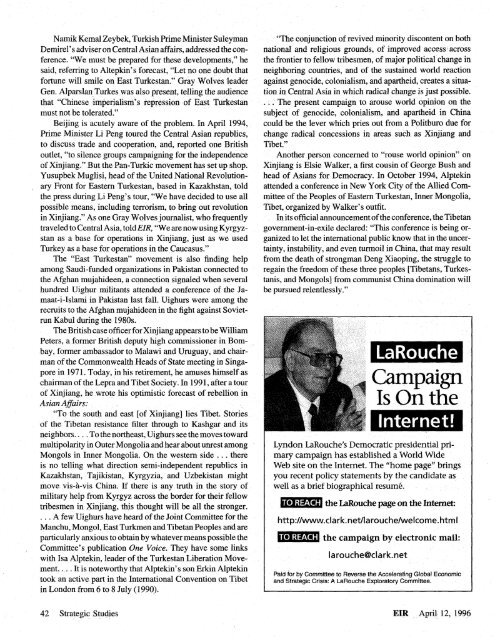Full Issue (PDF) - Executive Intelligence Review
Full Issue (PDF) - Executive Intelligence Review
Full Issue (PDF) - Executive Intelligence Review
Create successful ePaper yourself
Turn your PDF publications into a flip-book with our unique Google optimized e-Paper software.
Namik Kemål Zeybek, Turkish Prime Minister Suleyman<br />
Demirel' s adviser on Central Asian affairs, addressed the conference.<br />
"We must be prepared for these developments," he<br />
said, referring to Altepkin's forecast, "Let no one doubt that<br />
fortune will smile on East Turkestan." Gray Wolves leader<br />
Gen. Alparslan Turkes was also present, telling the audience<br />
that "Chinese imperialism's repression of East Turkestan<br />
must not be tolerated."<br />
Beijing is acutely aware of the problem. In April 1994,<br />
Prime Minister Li Peng toured the Central Asian republics,<br />
to discuss trade and cooperation, and, reported one British<br />
outlet, "to silence groups campaigning for the independence<br />
of Xinjiang." But the Pan-Turkic movement has set up shop.<br />
Yusupbek Muglisi, head of the United National Revolutionary<br />
Front for Eastern Turkestan, based in Kazakhstan, told<br />
the press during Li Peng's tour, "We have decided to use all<br />
possible means, including terrorism, to bring out revolution<br />
in Xinjiang." As one Gray Wolves journalist, who frequently<br />
traveled to Central Asia, told EIR, "We are now using Kyrgyzstan<br />
as a base for operations in Xinjiang, just as we used<br />
Turkey as a base for operations in the Caucasus."<br />
The "East Turkestan" movement is also finding help<br />
among Saudi-funded organizations in Pakistan connected to<br />
the Afghan mujahideen, a connection signaled when several<br />
hundred Uighur militants attended a conference of the Jamaat-i-Islami<br />
in Pakistan last fall. Uighurs were among the<br />
recruits to the Afghan mujahideen in the fight against Sovietrun<br />
Kabul during the 1980s.<br />
The British case officer for Xinjiang appears to be William<br />
Peters, a former British deputy high commissioner in Bombay,<br />
former ambassador to Malawi and Uruguay, and chairman<br />
of the Commonwealth Heads of State meeting in Singapore<br />
in 1971. Today, in his retirement, he amuses himself as<br />
chairman of the Lepra and Tibet Society. In 1991, after a tour<br />
of Xinjiang, he wrote his optimistic forecast of rebellion in<br />
Asian Affairs:<br />
"To the south and east [of Xinjiang] lies Tibet. Stories<br />
of the Tibetan resistance filter through to Kashgar and its<br />
neighbors.... To the northeast, Uighurs see the moves toward<br />
multipolarity in Outer Mongolia and hear about unrest among<br />
Mongols in Inner Mongolia. On the western side .. . there<br />
is no telling what direction semi-independent republics in<br />
Kazakhstan, Tajikistan, Kyrgyzia, and Uzbekistan might<br />
move vis-a-vis China. If there is any truth in the story of<br />
military help from Kyrgyz across the border for their fellow<br />
tribesmen in Xinjiang, this thought will be all the stronger.<br />
... A few Uighurs have heard of the Joint Committee for the<br />
Manchu, Mongol, East Turkmen and Tibetan Peoples and are<br />
particularly anxious to obtain by whatever means possible the<br />
Committee's publication One Voice. They have some links<br />
with Isa Alptekin, leader of the Turkestan Liberation Movement.<br />
... It is noteworthy that Alptekin's son Erkin Alptekin<br />
took an active part in the International Convention on Tibet<br />
in London from 6 to 8 July (1990).<br />
"The conjunction of revived minority discontent on both<br />
national and religious grounds, of improved access across<br />
the frontier to fellow tribesmen, of major political change in<br />
neighboring countries, and of the sustained world reaction<br />
against genocide, colonialism, and apartheid, creates a situation<br />
in Central Asia in which radical change is just possible.<br />
... The present campaign to arouse world opinion on the<br />
subject of genocide, colonialism, and apartheid in China<br />
could be the lever which pries out from a Politbüro due for<br />
change radical concessions in areas such as Xinjiang and<br />
Tibet."<br />
Another person concerned to "rouse world opinion" on<br />
Xinjiang is Elsie Walker, a first cousin of George Bush and<br />
head of Asians for Democracy. In October 1994, Alptekin<br />
attended a conference in New York City of the Allied Committee<br />
of the Peoples of Eastern Turkestan, Inner Mongolia,<br />
Tibet, organized by Walker's outfit.<br />
In its official announcement of the conference, the Tibetan<br />
govemment-in-exile declared: "This conference is being organized<br />
to let the international public know that in the uncertainty,<br />
instability, and even turmoil in China, that may result<br />
from the death of strongman Deng Xiaoping, the struggle to<br />
regain the freedom of these three peoples [Tibetans, Turkestanis,<br />
and Mongols] from communist China domination will<br />
be pursued relentlessly."<br />
LaRouche<br />
Campaign<br />
Is On the<br />
Internet!<br />
Lyndon LaRouche's Democratic presidential primary<br />
campaign has established a World Wide<br />
Web site on the Internet. The "home page" brings<br />
you recent policy statements by the candidate as<br />
well as a brief biographical resume.<br />
TO REACH the LaRouche page on the Internet:<br />
http://www.clark.net/larouche/welcome.html<br />
TO REACH<br />
the campaign by electronic mail:<br />
larouche@clark.net<br />
Paid for by Committee to Reverse the Accelerating Global Economic<br />
and Strategic Crisis A LaRouche Exploratory Committee<br />
42 Strategic Studies EIR April 12, 1996

















